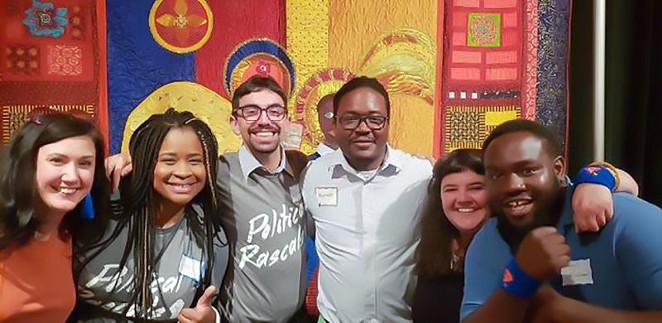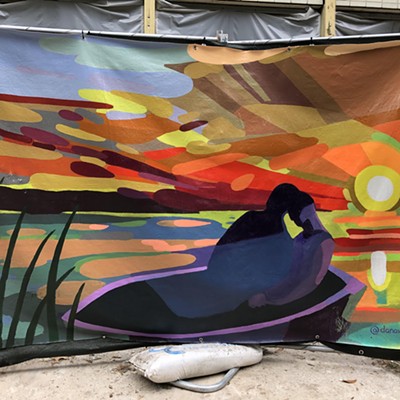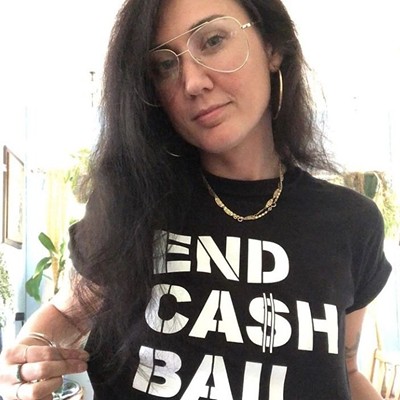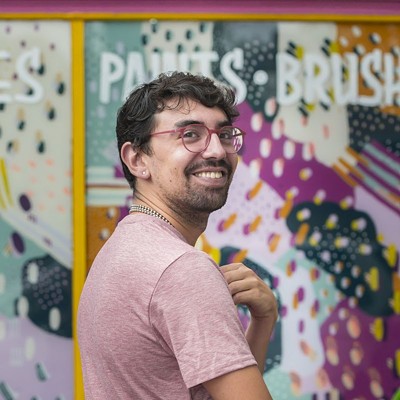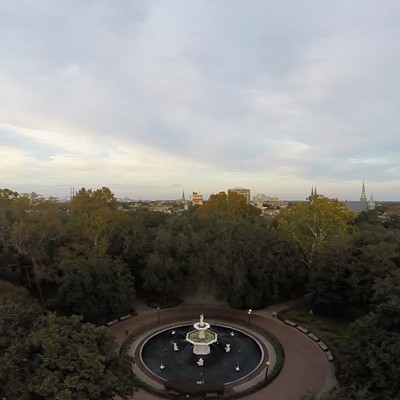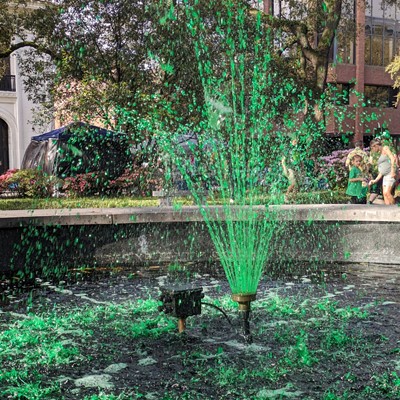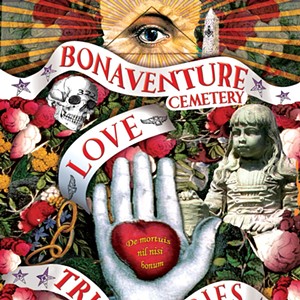TO MISQUOTE Michelle Obama, when they go high, we go low.
The Political Rascals is a group of nine community activists and friends who say they’re committed to making Savannah a more progressive city by addressing inequality and political disempowerment within our government.
The group recently formed a political action committee (PAC), Political Rascals PAC, Inc., and holds its first fundraiser for Georgia gubernatorial candidate Stacey Abrams on Sept. 6.
The fundraiser is a response to one the same evening for Republican candidate Brian Kemp, at 24e on Broughton Street.
The Kemp events calls for a contribution of $19,800 at the chair level. In line with their mission of reducing inequality in the community, the Political Rascals’ campaign calls for a contribution of $19.80 or “simply your presence,” they say.
We spoke with Political Rascals members Clinton Edminster and Coco Papy last week about the accessibility of political involvement, the ease of creating a PAC, and the importance of just showing up.
How did the Political Rascals get started?
Coco Papy: It's a great, frustrating collusion of a mess. I think that's something important to talk about. When doing these things, we don't think it's going to be like that. We think everything is going to go smoothly, but disagreements aren't a bad thing.
Clinton Edminster: The collaborative nature of this has been really...I wouldn’t say anything has been the product of one person.
CP: I think what helps ground us is that we’ve all been friends for a while now. We were brought together because we realized each of us were working in the community in a different capacity, but all working towards the bigger goal and vision for Savannah. What does a progressive Savannah look like? What does a progressive Georgia look like? And how are we able to influence that to happen? Whether we work in education or transportation or reproductive justice or voter registration, all of us realized, oh, we’re the people doing some of this work and we also get along. It bloomed out of a working friendship.
CE: One thing I like about the description for our group is “a passion for community organizing, self-care, and fine wine.” I really think the self-care aspect was the original catalyst for this group. We had this event about taking care of yourself with community organizing, right after the Women’s March on Washington, and there was this initial, “Whoa, what is going on right now and how do I deal with it?” Being able to be there for each other has morphed into being really secure and trustworthy with each other, which has allowed us to take on really complex projects, such as this one or forming a super PAC.
I get the feeling there’s a negative connotation with PACs left over from the 2016 election.
CP: I don't think people are necessarily wrong to have that perception. For me, when I think of a PAC, I think of Citizens United. I think of Beto O'Rourke's campaign he's running in Texas right now, where he says, "I will take no money from PACs." PACs have not always been used as a tool for good, but some of them have been, though. Plenty of people have done work that pushed forth progressive issues through a PAC.
For us, the reason we chose a PAC is because there are limitations to grassroots organizing, there are limits to nonprofit work. At the end of the day, we saw a PAC as a tool to take [our group] to the next level. We’re all looking at this, not as this big ol’ money maker, but instead as a tool for how we push forth progressive agendas. Specifically, how do we support progressive candidates, progressive ballot initiatives, and progressive legislation in the south and southeast? That’s where we saw this being really effective.
CE: Things are designed to help people understand and to confuse people for a purpose. I think super PACs have been used in the past as, “Ooh, it’s scary and it’s big and you can’t get involved.” One thing we’re trying to do is take that and be like, “No, PACs are tools and they’re fairly easy to understand.” We created the Political Rascals PAC, Inc. in less than 24 hours. The interesting question is, should it be that way? Should it be that easy?
CP: What we’re seeking to do is demystify the process. I really want people to look at this and be like, “Well, if they can do it.” If someone had asked me if I’d be interested in forming a PAC five years ago, I would have said, “No, I’m not capable, I don’t have the skill set, I’m not a lawyer.” I think if I, the college-educated privileged person walking through this world, feel that way, who else feels that way?
There are different ways of attacking any sort of issue. You can do it grassroots, boots on the ground. You can do it through a 501(c)(3) nonprofit and advocate for what it is you want. You can do it from a 501(c)(4) perspective. This is just another solution.
Since you push progressive ideals, was supporting Abrams an obvious choice?
CP: It was the choice we all supported. We're getting a lot of questions on why this, why that. When we're moving unilaterally on something like this, we're all going to have different perspectives on things based on our experience, our background, who we are in this world. This was just an easy, "Yes, of course this makes sense for us."
You ask for a contribution of $19.80 in your fundraiser. Can you explain the significance of that number?
CE: We saw the flyer from the Brian Kemp fundraiser and I think we were all shocked to see the number for the chair contribution level as $19,800. In context of Savannah's poverty level, the financial struggling, it came as a shock. I think we all understand that money is incredibly important to politics, but personally, I felt like this crossed a line.
The whole design of the fundraiser is to flip it on its head. It is going to be literally a thousand times cheaper. And the point, which I’ll keep saying forever and ever, is that money shouldn’t decide who the next governor of Georgia is. The people should decide. If I could encapsulate this into one sentence, that would be it. People can’t afford $19,800. People can afford $19.80. And if you can’t afford that, just give us a dollar. And if you can’t afford that, then just show up.
CP: There are other ways of supporting politics other than a monetary donation. At this event, you’ll meet different organizations that have really good ground games going on. You can sign up for a canvassing shift or a phone banking shift or to knock on doors and talk to people. Ultimately, that’s what they want.
To affirm what Clinton said, when I saw that flyer, I was like, “That is half of my yearly income.” I’m a single person who makes above the median household income in Savannah. I think about that a lot. Who is politics for if we’re setting such a high financial number?
Again, none of us are naïve enough to believe that money doesn’t matter. Money pays for staff, flyers, the nitty-gritty that you have to get done. But politics should not be something you can only participate in if you have the wealth to do so. It should be something anyone can participate in.
CE: Another part of it is to get people excited about politics. Politics is one of the most amazing things you can get involved with.
CP: We’re trying to be visible in our numbers. Chatham County always goes blue. We go blue in most of our elections, but for me, personally, I feel that anyone who has progressive beliefs or agendas are defensive, like “Oh, well, I kind of feel this way.” Let’s just be unapologetic about who we are and who we support and let’s play this game.
Have you always been involved in politics?
CP: I have actually been very frightened by politics. When I moved back to Savannah, I thought it was not something I could get involved in at all. It was very intimidating. I was comfortable doing community organization and grassroots work, but I felt that I was not the type of person who could ever be involved in politics.
My entry was seeing [fellow Political Rascal] Amanda Hollowell. She had gone to Georgia’s WIN List and that was the first time I saw someone I could relate to. I was like, “Yeah, I can be involved in politics. I can help out on a campaign and maybe run for office.” That was the thing that got me interested—I wanted to be like her.
And not to get too academic about it, but I think we have to think about what that question [of political involvement] has typically meant. Before, when people asked you, “Are you involved in politics?” it was, “Are you paid staff or a candidate or an elected official?” Now that line has been blurred a bit.
I asked some of the folks canvassing last week, “Do you feel like you’re involved in politics?” They all said absolutely. They’re volunteering. They’re not running for office, they don’t want to, but they feel like they now have a stake in this. And that, to me, is what this is about—us trying to push that ownership.

